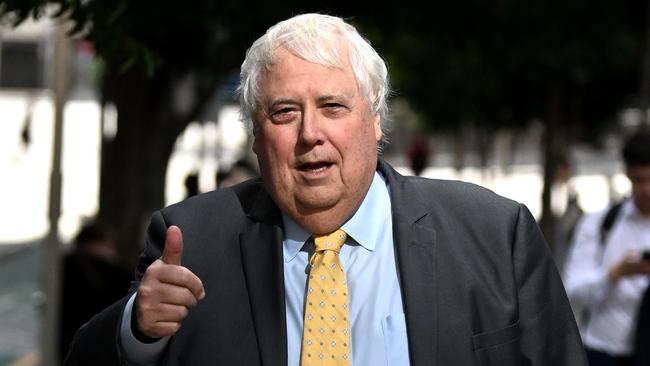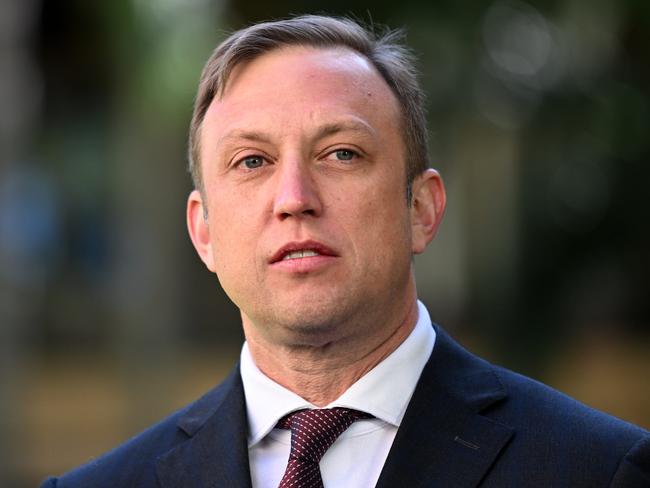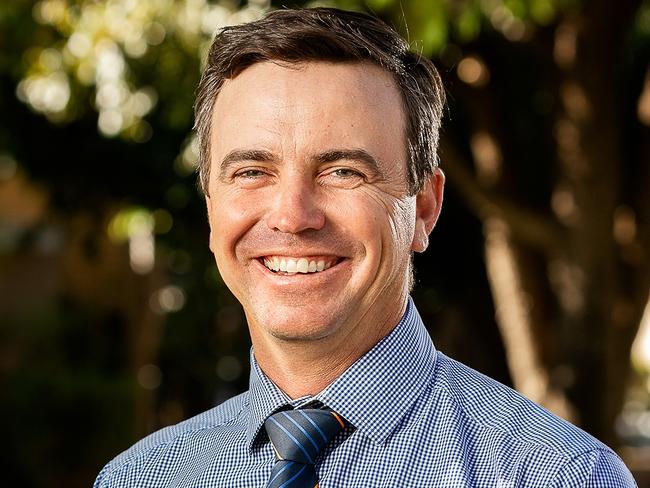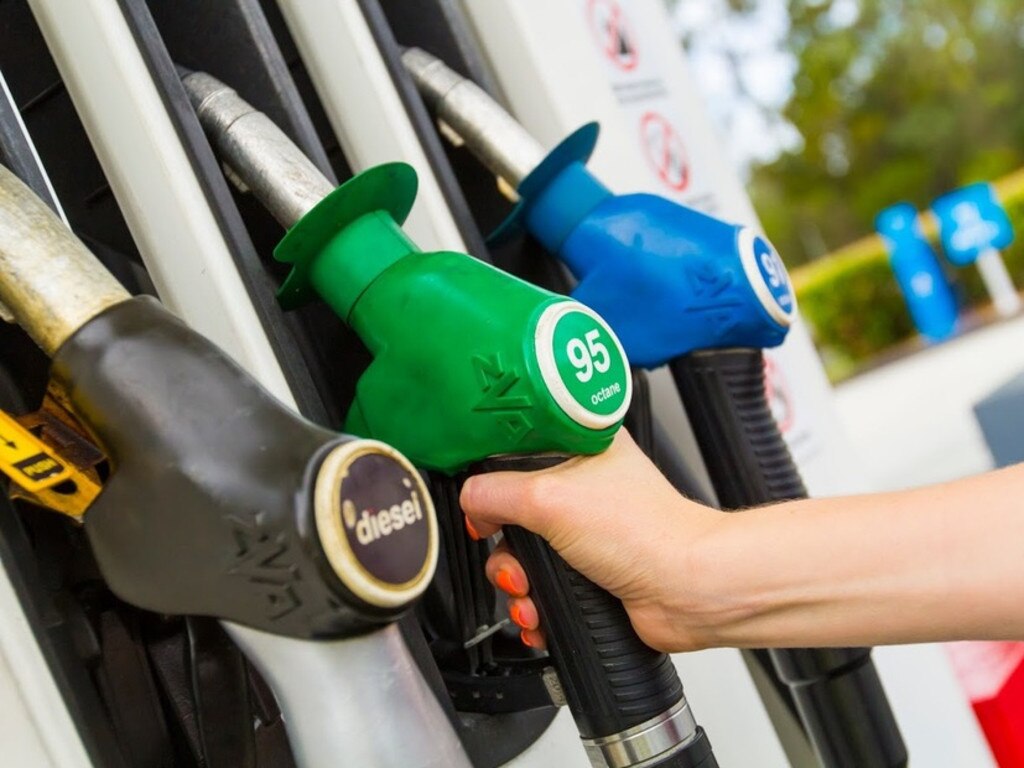Axe hanging over Clive Palmer’s ‘clean’ coal project
The nation’s only live proposal for a low-emissions coal-fired power station is likely to be rejected by the Queensland government.

The nation’s only live proposal for a low-emissions coal-fired power station is likely to be rejected by the Queensland government on environmental grounds.
Clive Palmer’s $3.5bn proposal for the plant in the Galilee Basin has the support of the local community and was due to create nearly 600 jobs, but the state government says the plan poses “irreversible risks to the environment” and may not be in the public interest.
Deputy Premier Steven Miles “called-in” the central Queensland project late last year, seizing control of its approval from the local council, which said the community largely backed it.
The Department of Environment and Science has told Mr Palmer’s Waratah Coal its preliminary view “is that an approval may not be in the public interest in that it may be inconsistent with public commitments made by the Queensland government”.
“Whilst the activity represents potential positive social and economic impacts, the irreversible risks to the environment may outweigh these,” a Waratah Coal report quotes the department as saying.
Conservationists say it is the first time the environment department has said a coal project may not be in the public interest.
Senior government sources say the primary concerns are climate change and meeting its renewable energy target of 50 per cent by 2030.

The push back on Mr Palmer’s proposal comes as Anthony Albanese resists pressure from the Greens to declare a moratorium on future fossil fuel projects, with the Prime Minister citing the “devastating impact on the Australian economy”.
Internal documents show the power station is forecast to emit 9.427 million tonnes of carbon dioxide a year at its full 1400MW capacity, and run for 50 years.
But Mr Palmer’s company argues the “ultra-supercritical” “high-efficiency low-emissions” power station – which will be supplied with coal by its proposed nearby Galilee Basin coalmine – would be carbon neutral and achieve “net-zero emissions,” by buying carbon offsets and later developing carbon capture and storage technology.
The power plant would be built on a cattle property near Alpha, 440km west of Rockhampton in central Queensland, and Waratah Coal says it will need about 545 workers during construction and 90 to operate the power station.
Documents show the environment department had demanded more information from Waratah Coal about the emissions.
“Given the project’s contribution to an increase in greenhouse gas emissions, the resilience and values of the receiving environment may be impacted due to long-term and cumulative impacts of climate change,” the department said.
In response, Waratah Coal said the project was consistent with the government’s renewable energy and emissions-reduction targets, and claimed it had the potential of reducing emissions by replacing older, less-efficient power stations.
Federal Environment Minister Tanya Plibersek last week indicated she would refuse federal approval for another of Mr Palmer’s coal projects, a proposed open-cut coalmine 130km northwest of Rockhampton, due to the impact on the Great Barrier Reef.

Mr Miles is expected to make a decision on Waratah Coal’s power station application by the end of the year, after public consultation.
Mr Palmer declined to comment, as did Mr Miles.
Indian conglomerate Adani – now called Bravus – Gina Rinehart and Waratah Coal were fighting to be the first to get their competing projects off the ground last decade when the Galilee Basin promised to be a booming, thermal coal-rich region.
But so far only Bravus’s Carmichael coalmine is up and running, and Mr Palmer’s Galilee Basin coalmine proposal is tied up in the state’s Land Court. Other companies have sold their interests or let them lie dormant.
It’s not clear whether the environment department’s view that Waratah’s coal-fired power station is not in the public interest will extend to open-cut coalmines.
Annastacia Palaszczuk’s Labor government has promised to reach 50 per cent renewable energy by 2030 and net zero emissions by 2050, but she has also declared its support for the state’s coal industry.
In June, the government gave environmental approval to extend New Hope’s New Acland coalmine on the Darling Downs by another 12 years. Last year it approved an $82m metallurgical coalmine extension in central Queensland’s Isaac Plains region, forecast to produce 2.5 million tonnes of coking coal a year for 10 years.
Barcaldine mayor Sean Dillon – whose council was considering the proposal before Mr Miles called it in – said he “respectfully completely and utterly disagreed” with the environment department’s statement that the power station was not in the public interest.
“The vast majority of both the immediate local community at Alpha and the broader central west and central highlands see it as an extremely positive future economic development opportunity,” Mr Dillon said.
“It would be constructed in an area where there’s limited employment opportunities outside traditional roles of agriculture and tourism and would offer the opportunity to expand the population in the area, and also retain generations to come of school leavers.”
Mr Dillon said he disagreed with the department’s view that the plant represents “potential” positive social and economic impacts. “It’s proven that there’s social and economic benefits. We’ve only got to look over the hill at (resource) developments that have occurred in the Bowen Basin to prove the long-lasting benefits to the communities there,” he said.
But he said his community was feeling pessimistic that the project would “ever see the light of day”.
Queensland Conservation Council director Dave Copeman said the government should take the environment department’s concerns seriously and “pull the plug on this damaging, wasteful project”.
“Waratah Coal’s power station proposal does not stack up environmentally or economically and there has been no appetite for it from the grid or the community,” Mr Copeman said.
“At a time when Queensland is moving towards net-zero emissions, Waratah is proposing a brand new project that would burn 4 million tonnes of coal a year for the next 30 to 50 years.”
Mr Copeman said Waratah Coal’s emission reduction claims were “illogical” and relied on “expensive and unproven” carbon capture technology, as well as “hugely problematic” offset credits.







To join the conversation, please log in. Don't have an account? Register
Join the conversation, you are commenting as Logout